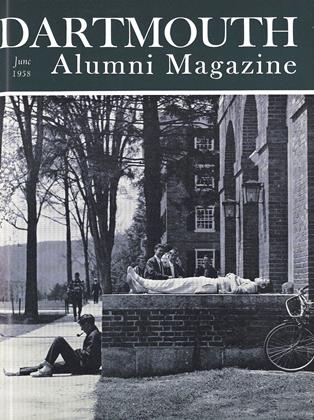A History of Bacon's Rebellion in Virginia.By Wilcomb E. Washburn '48. ChapelHill: University of North Carolina Press,1957. 248pp. $5.00.
One of the most familiar episodes of early American history has been Bacon's Rebellion, which occurred in Virginia in the year 1676. Although there has always been a certain vagueness in regard to the causes of the uprising, the tendency has been to attribute it to the forces of liberalism, headed by Nathaniel Bacon, and directed against the reactionary group in power in Virginia which centered around Governor Sir William Berkeley. This version of the rebellion has been put forward by Thomas Jefferson Wertenbaker in his The Torchbearer of theRevolution, and his interpretation has been accepted by almost all of the textbook accounts which have been written. This explanation of the matter is rejected by the author, however, as not being in accord with the facts, and has resulted from the circumstance that the American Revolution came just one hundred years later. Historians have been prone to regard Bacon's Rebellion as an early example of the revolutionary attitude which manifested itself in certain of the colonies prior to the War of Independence.
The present volume was the result of a project for a study of the legal and moral justification for dispossessing the American Indians of their lands. In the course of his preliminary research on this theme, Mr. Washburn was impressed by the discovery of new materials on the background of Bacon's Rebellion which led him to focus his efforts upon the causes of the movement. Earlier accounts had for the most part emphasized the alleged tyrannical rule of Governor Berkeley and had extolled the liberal leader-ship of Bacon. The key to the author's treatment appears in chapter one entitled "The Rise of a Democratic Myth" which reveals an attitude of sympathy for Berkeley and a critical point of view with regard to Bacon. He announces it as his purpose to revise "the images of Bacon the democratic hero and Berkeley the tyrannical loyalist." The volume as a whole is an elaboration of this thesis.
One thing the author has proved beyond a doubt. The causes of the revolt were much more complex than have been generally appreciated. The trouble with the Indians along the frontier represented the spark which touched off the conflagration. There was, however, "something else in the wind," which included the low price of tobacco, the oppressive role of the English merchants, heavy taxes, and the restraints of trade due to the Navigation Acts. The reviewer feels that a little more stress should have been placed upon the personalities and the psychology of both Bacon and Berkeley as factors in the revolt. The author has been most diligent in his quest for material which has disclosed a large number of new manuscripts as well as published sources. The footnotes contain citations of authority for almost every statement contained in the text. We learn from the excellent Essay on the Sources that the author is editing a volume of documents from English collections which will be published by the Virginia Historical Society. One hopes that this new material on the Rebellion will ultimately throw more light upon Bacon's motives in stirring up insurrection, which need clarifying. The materials already available in the present volume have gone far to cause us to revise our estimate of Sir William Berkeley.
 View Full Issue
View Full Issue
More From This Issue
-
 Feature
FeatureTHE GOALS of a Business Society
June 1958 By ALBERT NICKERSON, -
 Feature
FeatureMUSIC FESTIVAL
June 1958 By GEORGE O'CONNELL -
 Feature
FeatureANTIGONE
June 1958 -
 Feature
FeatureMAY: It's Marvelous
June 1958 -
 Class Notes
Class Notes1918
June 1958 By ERNEST H. EARLEY, RICHARD A. HOLTON -
 Class Notes
Class Notes1910
June 1958 By RUSSELL D. MEREDITH, ANDREW J. SCARLETT, HERB WOLFF '10
WAYNE E. STEVENS
-
 Books
BooksFACULTY PUBLICATIONS
March, 1926 By Wayne E. Stevens -
 Books
BooksHOW TO RUN A WAR.
December 1936 By Wayne E. Stevens -
 Books
BooksELEAZAR WHEELOCK: FOUNDER OF DARTMOUTH COLLEGE,
October 1939 By Wayne E. Stevens -
 Books
BooksEMPIRE OR INDEPENDENCE: A STUDY IN THE FAILURE OF RECONCILIATION, 1774-1783
October 1941 By Wayne E. Stevens -
 Books
BooksDEMOCRACY FIGHTS: A HISTORY OF NEW HAMPSHIRE IN WORLD WAR II
May 1951 By WAYNE E. STEVENS -
 Books
BooksIMPACT: THE BATTLE STORY OF THE TENTH ARMORED DIVISION.
July 1954 By WAYNE E. STEVENS
Books
-
 Books
BooksAlumni Articles
April 1956 -
 Books
BooksBriefly Noted
JULY 1966 -
 Books
BooksAlumni Articles
JANUARY 1967 -
 Books
BooksA BRAVERY OF EARTH
AUGUST 1930 By F. L. Childs -
 Books
BooksNotes on a Yale man's journal and the 'elbowing self-conceit of youth.'
MARCH 1978 By R.H.R. -
 Books
BooksTHE WAY OF LAO TZU.
JUNE 1964 By T.S.K. SCOTT-CRAIG


